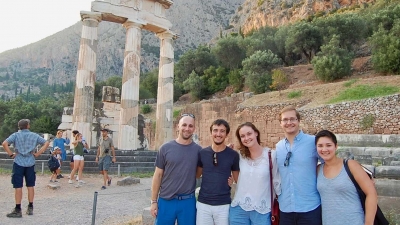
This past August, some fellow grad students and I attended the Paideia Institute's Living Greek in Greece program, a two-week spoken-Ancient Greek program based out of the tiny seaside town of Selianitika, Greece. A group of about 30 philhellenes--ranging from high school students and undergraduates to grad students, professors, and even a poet-in-residence--gathered in the picturesque "Garden of the Muses" to read Hesiod and discuss it--all in Ancient Greek. After a brief introduction in Athens, we dove right in: no translation of the text, just reading and discussing in the ancient language. Braving the 100+ degree August heat (with the help of frequent swims in the ocean, just steps away), we met twice every day under the trees. While my first couple of seminars were confusing, by the end of the two weeks I found I was able to understand almost everything we discussed, as well as contribute my own thoughts on mythology, literary theory, and philosophy. Without such an immersive experience, I would never have gained the confidence and skills to speak an ancient language and actually allow others to understand me!

During the program, we took a trip to Delphi to visit the site of the Temple of Apollo and the archaeological museum nearby. We hiked to the Cave of Pan, where, despite being quite sweaty and hot, we started a fire and sang the Hymn to Pan as part of our own modern ritual. I'm so thankful for the opportunity to travel in Greece for this program: not only was it my first experience speaking Ancient Greek, but it was also my first time in Greece. I was able to explore Athens, the Acropolis, and numerous archaeological museums, as well as interact with Greek people and hear the differences between the ancient and modern tongues. I'm especially lucky to have spent time in the Garden of the Muses with other Duke students--and one professor! My Greek language ability, archaeological and historical knowledge, and cultural awareness have all benefited from my time there.
